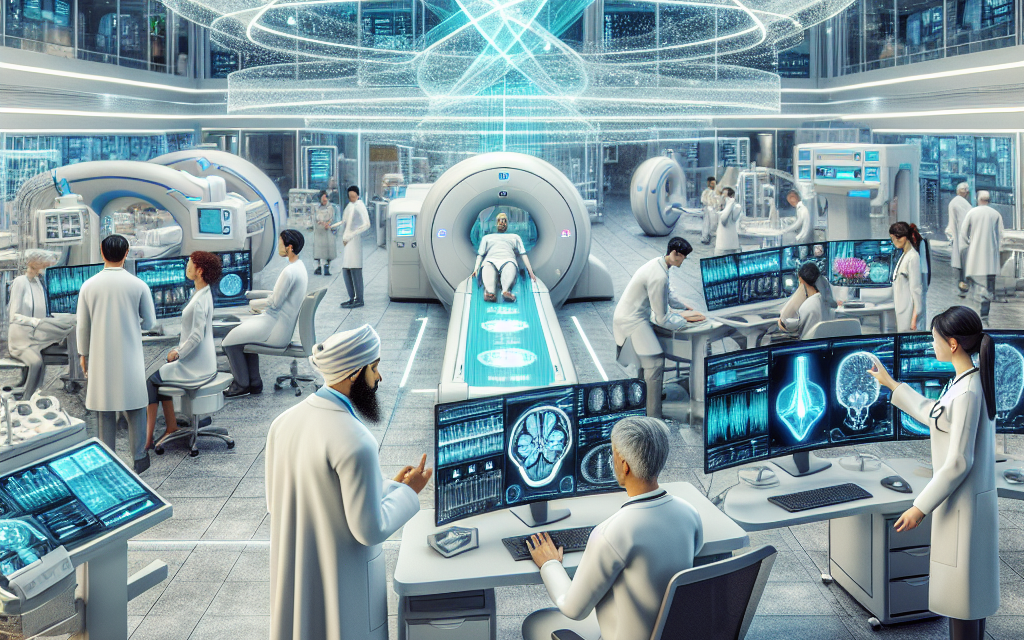Korea University Medical Center Advances Precision Medicine with AI Innovations
The integration of artificial intelligence (AI) into healthcare has revolutionized the way medical professionals diagnose, treat, and manage diseases. Korea University Medical Center (KUMC) stands at the forefront of this transformation, leveraging AI technologies to enhance precision medicine. This article explores the advancements made by KUMC in precision medicine through AI innovations, focusing on five key areas: AI in diagnostics, personalized treatment plans, predictive analytics, patient management systems, and ethical considerations in AI applications.
AI in Diagnostics: Revolutionizing Disease Detection
One of the most significant contributions of AI in healthcare is its ability to improve diagnostic accuracy. KUMC has implemented various AI-driven diagnostic tools that assist healthcare professionals in identifying diseases at earlier stages, which is crucial for effective treatment.
AI algorithms, particularly those based on machine learning, can analyze vast amounts of medical data, including imaging studies, lab results, and patient histories. For instance, KUMC has developed AI models that analyze radiological images to detect conditions such as lung cancer, breast cancer, and neurological disorders. These models are trained on thousands of images, allowing them to recognize patterns that may be missed by the human eye.
- Case Study: Lung Cancer Detection – KUMC’s AI system for lung cancer detection has shown a remarkable accuracy rate of over 90%. By comparing AI assessments with traditional diagnostic methods, researchers found that the AI system could identify early-stage tumors that were previously undetectable.
- Integration with Electronic Health Records (EHR) – The AI diagnostic tools at KUMC are integrated with EHR systems, allowing for real-time analysis of patient data. This integration ensures that healthcare providers have access to the most current information, facilitating timely and accurate diagnoses.
- Continuous Learning – The AI models at KUMC are designed to continuously learn from new data. As more cases are analyzed, the algorithms improve, leading to better diagnostic capabilities over time.
Moreover, KUMC’s commitment to research and development in AI diagnostics has led to collaborations with tech companies and academic institutions. These partnerships aim to refine existing algorithms and develop new ones, ensuring that KUMC remains at the cutting edge of diagnostic technology.
Personalized Treatment Plans: Tailoring Care to Individual Needs
Precision medicine is fundamentally about tailoring medical treatment to the individual characteristics of each patient. KUMC utilizes AI to create personalized treatment plans that consider genetic, environmental, and lifestyle factors.
Through genomic sequencing and analysis, KUMC can identify specific mutations and biomarkers associated with various diseases. AI algorithms analyze this genetic data alongside clinical information to recommend personalized treatment options. For example, in oncology, KUMC has successfully implemented AI-driven platforms that suggest targeted therapies based on a patient’s unique genetic profile.
- Case Study: Breast Cancer Treatment – In a recent study, KUMC utilized AI to analyze genetic data from breast cancer patients. The AI system recommended treatment plans that included targeted therapies, resulting in a 30% improvement in patient outcomes compared to standard treatment protocols.
- Integration of Multi-Omics Data – KUMC’s approach to personalized medicine involves integrating multi-omics data (genomics, proteomics, metabolomics) to provide a comprehensive view of a patient’s health. AI algorithms process this complex data to identify the most effective treatment strategies.
- Patient Engagement – Personalized treatment plans developed through AI not only improve clinical outcomes but also enhance patient engagement. Patients are more likely to adhere to treatment regimens when they understand that their care is tailored specifically to their needs.
The success of personalized treatment plans at KUMC underscores the importance of interdisciplinary collaboration among geneticists, oncologists, and data scientists. This collaborative approach ensures that the latest advancements in AI and genomics are effectively translated into clinical practice.
Predictive Analytics: Anticipating Health Outcomes
Predictive analytics is another area where KUMC is making significant strides. By utilizing AI to analyze historical patient data, KUMC can predict future health outcomes and identify patients at risk for certain conditions.
AI algorithms can process vast datasets, including demographic information, medical histories, and treatment responses, to identify patterns and trends. This capability allows healthcare providers to intervene early, potentially preventing the onset of diseases or complications.
- Case Study: Diabetes Prediction – KUMC developed a predictive model that analyzes patient data to identify individuals at high risk for developing type 2 diabetes. The model has successfully identified at-risk patients, allowing for early intervention through lifestyle modifications and preventive care.
- Risk Stratification – The predictive analytics tools at KUMC enable healthcare providers to stratify patients based on their risk levels. This stratification helps prioritize care for high-risk patients, ensuring they receive timely interventions.
- Resource Allocation – By predicting patient needs, KUMC can optimize resource allocation within the hospital. For example, if the predictive model indicates a surge in patients with respiratory issues during flu season, KUMC can prepare by increasing staffing and resources in relevant departments.
The implementation of predictive analytics at KUMC not only enhances patient care but also contributes to more efficient healthcare delivery. By anticipating health outcomes, KUMC can proactively address potential issues, ultimately improving patient satisfaction and outcomes.
Patient Management Systems: Enhancing Care Coordination
Effective patient management is crucial for delivering high-quality healthcare. KUMC has integrated AI into its patient management systems to streamline care coordination and improve communication among healthcare providers.
AI-driven patient management systems can automate administrative tasks, such as appointment scheduling and follow-up reminders, allowing healthcare providers to focus more on patient care. Additionally, these systems facilitate better communication between different departments, ensuring that all members of a patient’s care team are informed and aligned.
- Case Study: AI-Enhanced Care Coordination – KUMC implemented an AI-powered care coordination platform that connects primary care physicians with specialists. This platform has reduced referral times by 40%, ensuring that patients receive timely consultations and treatments.
- Telemedicine Integration – The patient management system at KUMC includes telemedicine capabilities, allowing patients to consult with healthcare providers remotely. AI algorithms help triage patient inquiries, directing them to the appropriate provider based on their needs.
- Patient Engagement Tools – KUMC’s patient management system includes tools that empower patients to take an active role in their healthcare. Features such as personalized health reminders and educational resources enhance patient engagement and adherence to treatment plans.
The integration of AI into patient management systems at KUMC exemplifies the potential for technology to enhance care coordination and improve patient experiences. By streamlining processes and facilitating communication, KUMC is setting a new standard for patient-centered care.
Ethical Considerations in AI Applications: Navigating Challenges
As KUMC advances its use of AI in precision medicine, it is essential to address the ethical considerations that accompany these innovations. The deployment of AI technologies in healthcare raises important questions about data privacy, algorithmic bias, and informed consent.
Data privacy is a significant concern, as AI systems require access to sensitive patient information. KUMC is committed to ensuring that patient data is protected through robust security measures and compliance with regulations such as the Health Insurance Portability and Accountability Act (HIPAA).
- Algorithmic Bias – One of the challenges in AI applications is the potential for algorithmic bias, which can lead to disparities in healthcare outcomes. KUMC actively works to mitigate bias by ensuring diverse datasets are used to train AI models, promoting fairness and equity in healthcare delivery.
- Informed Consent – As AI technologies become more integrated into clinical practice, obtaining informed consent from patients is crucial. KUMC emphasizes transparency in its AI applications, ensuring that patients understand how their data will be used and the implications of AI-driven decisions.
- Continuous Monitoring and Evaluation – KUMC recognizes the importance of continuously monitoring AI systems for performance and ethical compliance. Regular audits and evaluations help identify potential issues and ensure that AI applications align with ethical standards.
By addressing these ethical considerations, KUMC aims to build trust with patients and the broader community. The responsible use of AI in healthcare is essential for maximizing its benefits while minimizing potential risks.
Conclusion: The Future of Precision Medicine at KUMC
Korea University Medical Center is leading the way in advancing precision medicine through innovative AI technologies. By enhancing diagnostics, personalizing treatment plans, utilizing predictive analytics, improving patient management systems, and addressing ethical considerations, KUMC is setting a new standard for healthcare delivery.
The integration of AI into precision medicine not only improves patient outcomes but also enhances the overall efficiency of healthcare systems. As KUMC continues to explore new frontiers in AI and precision medicine, it serves as a model for other institutions seeking to harness the power of technology in healthcare.
In summary, the advancements made by KUMC in precision medicine with AI innovations highlight the transformative potential of technology in healthcare. By focusing on patient-centered care and ethical practices, KUMC is paving the way for a future where precision medicine becomes the norm, ultimately leading to better health outcomes for all.





